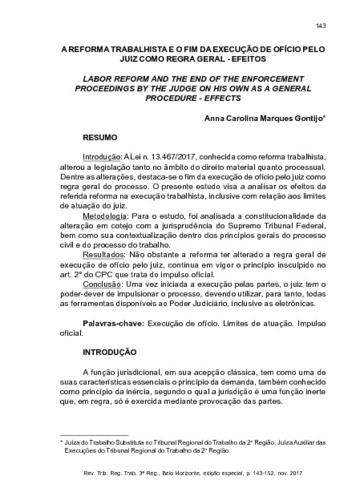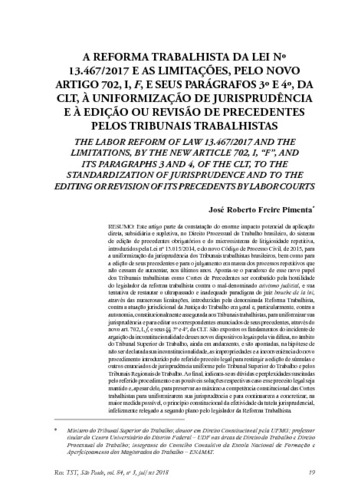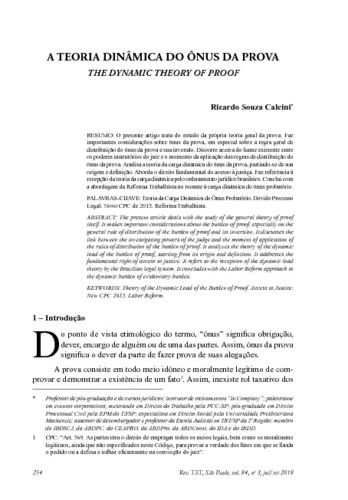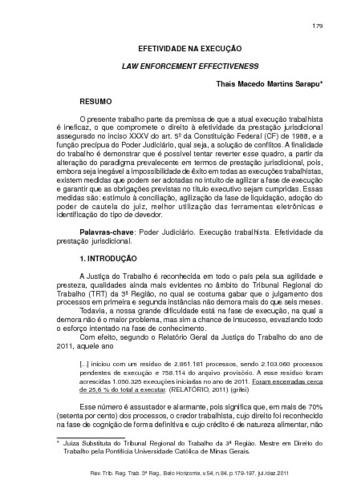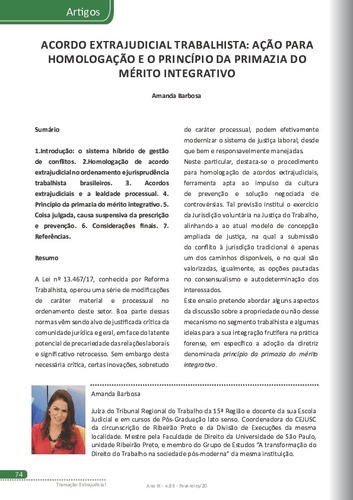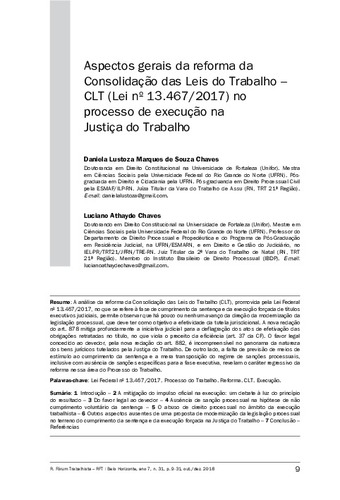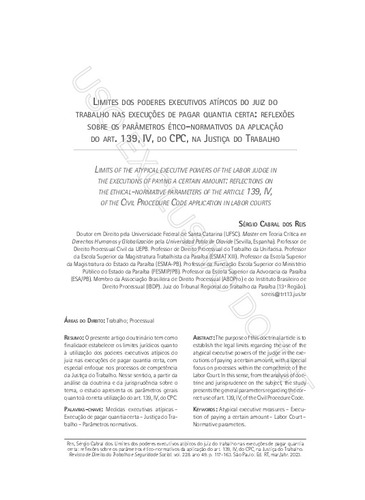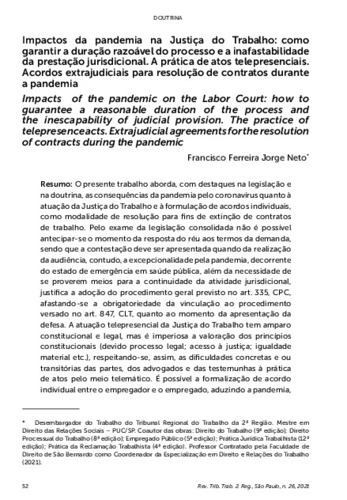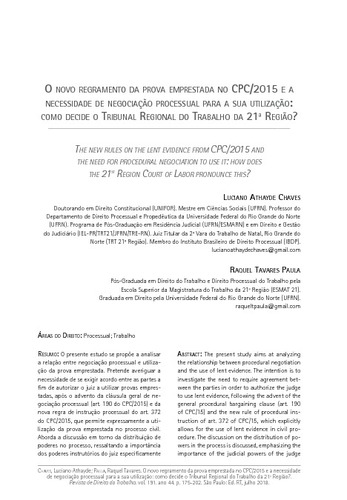Artigo de periódico
A reforma trabalhista e o fim da execução de ofício pelo juiz como regra geral: efeitos
| dc.contributor.author | Gontijo, Anna Carolina Marques | |
| dc.date.accessioned | 2018-03-15T17:15:42Z | |
| dc.date.available | 2018-03-15T17:15:42Z | |
| dc.date.issued | 2017-11 | |
| dc.identifier.citation | GONTIJO, Anna Carolina Marques. A reforma trabalhista e o fim da execução de ofício pelo juiz como regra geral: efeitos = Labor reform and the end of the enforcement proceedings by the judge on his own as a general procedure: effects. Revista do Tribunal Regional do Trabalho da 3ª Região, Belo Horizonte, n. especial, p. 143-152, nov. 2017. | pt_BR |
| dc.identifier.uri | https://hdl.handle.net/20.500.12178/127091 | |
| dc.description.abstract | [por] Analisa a constitucionalidade da alteração em cotejo com a jurisprudência do Supremo Tribunal Federal, bem como sua contextualização dentro dos princípios gerais do processo civil e do processo do trabalho. Não obstante a reforma ter alterado a regra geral de execução de ofício pelo juiz, continua em vigor o princípio insculpido no art. 2º do CPC que trata do impulso oficial. Uma vez iniciada a execução pelas partes, o juiz tem o poder-dever de impulsionar o processo, devendo utilizar, para tanto, todas as ferramentas disponíveis ao Poder Judiciário, inclusive as eletrônicas. | pt_BR |
| dc.description.abstract | [eng] Law n. 13,467/2017, known as the labor reform, changed the legislation both for provisions and procedures. Among those changes, the end of the enforcement proceedings by the judge on his own as a general procedure rule is worth noting. The purpose of this study is to analyze the effects of this reform on the labor enforcement proceedings, including the relation to the limits of the Judge’s action. For the study, the constitutionality of the amendment was examined, in comparison with the jurisprudence of the Federal Supreme Court, as well as its context within the general principles of the civil case and the labor case. Even though the reform has changed the general rule for the enforcement proceedings inherent to the judge, the principle expressed in article 2 of the Civil Procedure Code, that deals with the judge’s duty to act officially on the case, remains in force. Once the enforcement by the parties is initiated, the Judge has the power and the duty to expedite the process, and, he shall use for this purpose, all the tools available to the judiciary power, including the electronic ones. | pt_BR |
| dc.description.tableofcontents | Reforma trabalhista: constitucionalidade -- Execução por iniciativa da parte interessada: limites de atuação do juiz -- A nova redação do art. 878 da CLT e o uso de ferramentas eletrônicas de pesquisa -- Iniciativa da execução pela parte interessada x prescrição intercorrente | pt_BR |
| dc.language.iso | pt_BR | pt_BR |
| dc.relation | Brasil. Lei n. 13.467, de 13 de julho de 2017 | pt_BR |
| dc.relation.ispartof | Revista do Tribunal Regional do Trabalho da 3ª Região: (nov. 2017). Edição especial | pt_BR |
| dc.relation.uri | https://www.lexml.gov.br/urn/urn:lex:br:federal:lei:2017-07-13;13467 | pt_BR |
| dc.subject | Execução trabalhista, alteração, Brasil | pt_BR |
| dc.subject | Reforma trabalhista, Brasil | pt_BR |
| dc.subject | Juiz do trabalho, poderes e atribuições, Brasil | pt_BR |
| dc.title | A reforma trabalhista e o fim da execução de ofício pelo juiz como regra geral: efeitos | pt_BR |
| dc.title.alternative | Labor reform and the end of the enforcement proceedings by the judge on his own as a general procedure: effects | pt_BR |
| dc.relation.references | Brasil. Consolidação das leis do trabalho (CLT) (1943), art. 878 | pt_BR |
| dc.type.genre | Artigo de periódico | pt_BR |
| dc.identifier.rvbisys | 001117712 | |
| dc.relation.ispartoflink | https://hdl.handle.net/20.500.12178/126611 | pt_BR |
| dc.relation.referenceslink | https://www.lexml.gov.br/urn/urn:lex:br:federal:decreto.lei:1943-05-01;5452 | pt_BR |
Ce document figure dans la(les) collection(s) suivante(s)
-
Artigos9566


